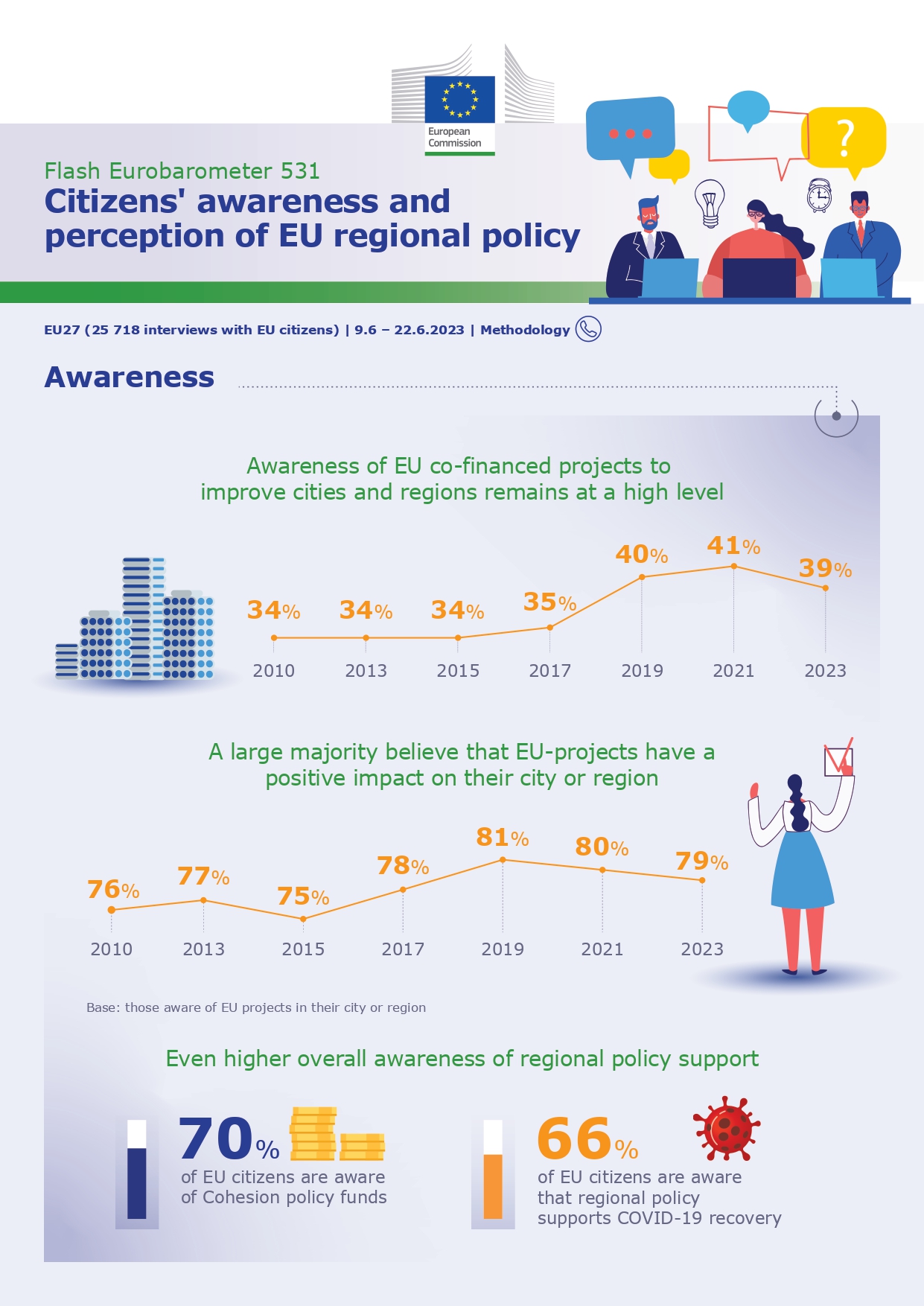Four in ten (39%) respondents say they have heard about EU co-financed projects to improve the area where they live. One in five (22%) reply that EU funded projects in their area contribute to a large extent to their feeling of being an EU citizen, according to the latest Eurobarometer survey on citizens’ awareness and perception of EU regional policy.
There is a large variation across the EU Member States in the proportion of respondents who report having heard about EU co-financed projects to improve the area where they live, ranging from 15% in Denmark to 80% in Poland. Compared to 2021, awareness of EU co-financed projects to improve the regions where respondents live has significantly decreased in Hungary (55%, -8 pp), Bulgaria (29%, -7 pp), Finland (29%, -7 pp), Latvia (62%, -5 pp) and Germany (16%, -4 pp).
About eight in ten respondents (79%) who have heard about EU co-financed projects in their region also say that the impact of these projects has been positive for the development of their city or region, while less than one in ten (7%) think the impact has been negative. In the longer term, the trend since 2010 shows a slight positive trend in the proportion seeing a positive impact – from 76% in 2010 to 79% in 2023, the Eurobarometer survey says.
In all but two Member States, at least three-quarters of respondents who have heard about EU co-financed projects in their regions think that these projects have had a positive impact on the development of their city or region. In seven countries, this view is shared by at least nine in ten respondents; this is the case, for example, in Malta and Finland (both 91%), Ireland (93%) and Poland (95%). At the lower end of the country ranking, in the Netherlands, 61% say that that EU co-funded projects have had a positive impact on the development of their city or region, but the overall lowest proportion is observed in Italy (56% ‘positive’ impact).
Almost one in two respondents (46%) say they have heard about the European Regional Development Fund (ERDF) and/or the Cohesion Fund, and a similar proportion (45%) have heard about the European Social Fund. However, just one in ten respondents say they have heard about Interreg (11%) and Just Transition Fund (12%). About one in three respondents (29%) say they have heard about REACT-EU or NextGenerationEU (the EU’s COVID-19 recovery plan).
On average, 16% of respondents say they have benefitted in their daily life from a project funded by the ERDF or the Cohesion Fund; 80% say they have not and 4% that they do not know. Poland stands out with 59% of respondents saying they have benefitted in their daily life from a project funded by the ERDF or the Cohesion Fund. In the Czech Republic, Estonia, Greece, Latvia, Slovakia and Slovenia, between 32% and 36% of respondents say that they have benefitted in this way. In seven countries, less than 10% of respondents say the same: the Netherlands (4%), Belgium and France (both 6%), Denmark, Italy, Sweden (all 7%) and Austria (9%).
About one in five (22%) reply that EU funded projects in their area contribute to a large extent to their feeling of being an EU citizen, and 35% say these projects contribute to some extent to this feeling. In most Member States (24 out of 27), at least half of respondents agree that EU funded projects in their area make them feel at least to some extent like an EU citizen. Poland stands out with 45% of respondents saying these projects make them, to a large extent, feel like an EU citizen, and 36% saying this applies to some extent.
